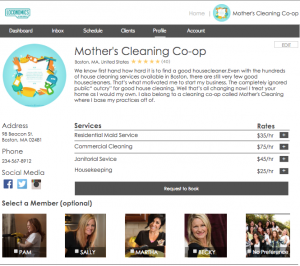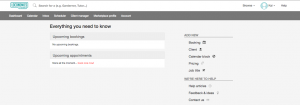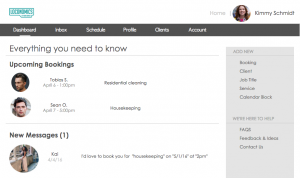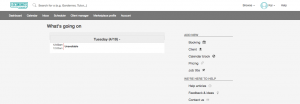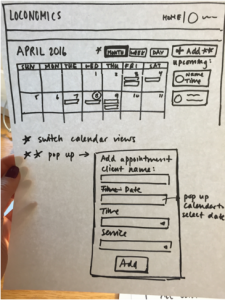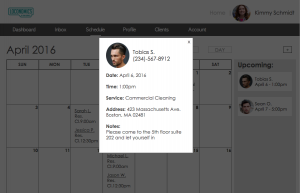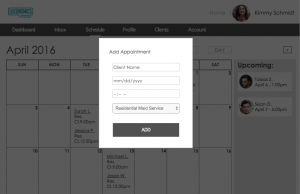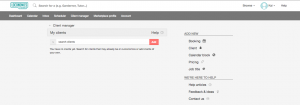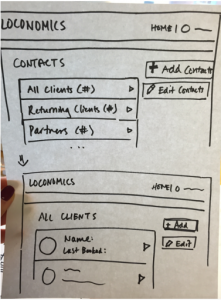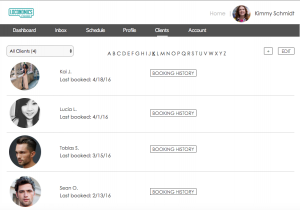This last week we’ve come up with a title for our project. We’ve decided to call it “Loconomics x Co-Everything: Modeling an Online Marketplace for Co-ops and Freelancers. And, although there are two sides to our prototype (co-op and freelancer), this one photo best represents both sides of our project (as their respective profile pages are almost identical).
Loconomics is an up and coming service-providing website and app co-founded by our extended client for this class, Joshua Danielson. This platform is similar to TaskRabbit, in which users can search for freelancers through the apps and alternatively freelancers can set up a profile and list their services to be hired.
Though it only exists as a prototype right now, Co-Everything is a single platform or reference list meant to help develop a network of cooperatives, local businesses, and future clientele in the Boston area. We aim to develop this platform to connect co-ops, local businesses, and freelancers with not only each other but with a consumer base as well. With our new excitement for the project at hand, we began focusing on creating a functional business model canvas for it.
Thus, we decided to combine our motivations behind Co-Everything to the current Loconomics platform by attempting to aid Loconomics in their beta stage. This collaboration includes testing the Loconomics prototype and finding ways they can improve based upon user feedback. By testing hypotheses through user testing and interviews and even building our own prototypes that serve similar functions, we hope to advance the effort connecting co-ops and clients through an online marketplace.
Co-ops need help connecting to other co-ops, connecting to clientele, advertising their services, and formalizing their transactions. On the other hand, consumers need help finding providers that match their values. This web platform will fulfill these needs and target towards consumers who are looking for specific services and those who want to support co-ops, local businesses, or freelancers. In addition to growing their consumer base, co-ops can benefit by finding other co-ops and freelancers.
The final version of the prototype ( http://ix8i2j.axshare.com/) has been updated with changes based on user feedback gathered at the DiscoTech. During this testing session we were able to see what may have not been as intuitive as we had thought as well as gather suggestions for how to improve it. A consistent issue we saw amongst almost every user was that they did not know that they had to switch tabs in the “Sign Up” pop-up in order to sign up as a co-op, freelancer, or client. In order to remedy this mix up, Kai edited the prototype by changing and darkening the labeled tab fonts and bolding them upon selection to make these differences more prominent. In addition to this, upon opening the “Sign Up” page, the selected automatically tab was “Client” which was located all the way to the right, but we assumed since people read from left to right, that it may be more intuitive to have the far left tab to be the default selection.
Before
After
In addition to this, another complaint we had with our prototype is that we should indicate which fields are required and which are optional during the profile creation stage in the setup process. We fixed this by adding the classic red stars next to required fields.
Another issue was with the “add service” field during setup and the “+” button which is intended to add the service and price of service to your listed services on your profile. We fixed this by making the hint text inside the “add service” textbox to “type to add service.” We also made this hint text a lighter font color to show that it is a field to be filled. Lastly, we added tooltips to the “type to add service” textbox, the “$/hr” textbox, and the “+” button. There was also some confusion when it came to the “add-on” option for services on a user’s service list, so there is now a tooltip for that as well.
In addition to these areas of confusion, users also had suggestions for additional features in the prototype. For example, a user said he’d like it if, when clicking on a message in the inbox, a pop-up would appear where the co-op or freelancer could message the client back. Following along this idea, we decided that the freelancer or co-op accept an inquiry and message back the client (but only after accepting the request). After accepting, the co-op or freelancer can see the client’s address and additional notes about the service request so that there is no breach of privacy and a client isn’t sharing their personal information with those they have not hired.
Our last major edit was adding a feature where you can schedule to add a booking by clicking directly on a date on the calendar on the scheduling page. This feature is located on the date “Friday, April 15” on the calendar.
Overall, there were a lot of great suggestions and this user testing proved to be essential to improving our prototype for Loconomics.
Link to our final presentation: http://bit.ly/co-everything-codesign-slides
Link to our Case Study: http://bit.ly/loconomicsXcoeverything-casestudy
